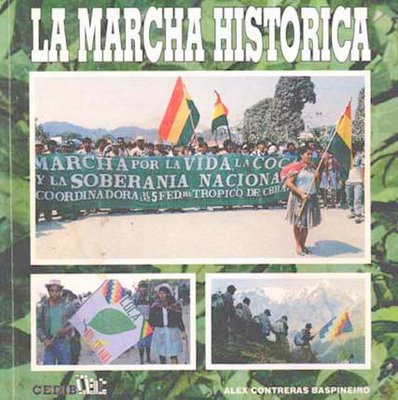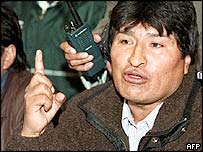




Leftist Appears to Be Winner in Bolivia =December 19, 2005
By Patrick J. McDonnell, Times Staff Writer
LA PAZ, Bolivia — Evo Morales, a former coca farmer who has pledged to torpedo U.S. anti-drug efforts here and be a "nightmare" for Washington, appeared set to become Bolivia's first Indian president after a surprisingly strong showing in Sunday's election.
Media tabulations of official results showed the leftist Morales with as much as 51% of the vote and his nearest rival, U.S.-educated former President Jorge "Tuto" Quiroga, with 31% to 34%.
Electoral authorities did not release final, certified results Sunday, but analysts and Morales' opponents acknowledged that he would be the next leader of this polarized Andean nation, where convulsive protests have ousted two presidents since 2003.
Quiroga conceded defeat and congratulated Morales and his Movement to Socialism alliance on their victory. The third-place finisher, Samuel Doria Medina, said Morales had won a "clear mandate."
Most experts had predicted that Morales would not win a majority, in which case Congress would decide the election outcome next month. But with more than 60% of the votes counted, local media reported, Morales was ahead by more than 40 percentage points in heavily populated La Paz province, 30 points in Cochabamba and Oruro provinces and 20 points in Potosi.
Even if the official results showed that Morales fell just short of the 50% needed in the first round, it appeared unlikely that Quiroga would challenge him in Congress.
Morales' supporters celebrated in the streets of this capital and other cities by the thousands, chanting, "Evo, presidente!" Fireworks illuminated La Paz and Cochabamba, the city where Morales, as representative of the growers of coca leaf — the raw ingredient in cocaine — rose to national prominence. Morales has pledged to decriminalize coca cultivation if he attains the presidency.
His career arc, from llama herder to coca farmer to activist and presidential candidate, has captivated many in this nation of 9 million, which is notorious for its lack of social mobility — particularly for Indians, who make up at least half the population.
Many here echo Morales' complaints that U.S.-backed economic and anti-drug policies have done little to enhance prosperity in a nation where an estimated six of every 10 residents live in poverty, with deprivation rife among the indigenous masses.
"This is the new history of Bolivia," Morales declared in an emotional victory speech in Cochabamba. "We, the indigenous people, have been called animals and savages…. That is not important anymore."
The Movement to Socialism alliance has grown from a regional group representing coca farmers to the nation's most important political group in a decade.
Morales promised to reach out to all sectors of Bolivia's people and heal the wounds that have riven the nation in recent years. He said "the truth" of his campaign had vanquished the "dirty war" that had linked him to drug traffickers during the campaign — allegations he repeatedly denied.
He also accused Bolivian electoral authorities of removing many citizens' names from voting registers, leaving thousands unable to participate in the election.
Aides said Morales' campaign had been prepared to make accusations of massive electoral irregularities if its candidate had failed to win.
In recent years, left-wing governments wary of Washington have taken power in Venezuela, Brazil, Argentina and Uruguay, and Morales' rapid ascension is another blow for U.S. policy in South America.
Among the first chief executives to call and offer congratulations, an aide to Morales said, were Venezuela's Hugo Chavez — an ardent U.S. critic — and Argentina's Nestor Kirchner, who has also followed a populist, left-wing political path.
Morales is a devoted fan of Chavez as well as Cuban President Fidel Castro. During last month's Summit of the Americas conference in Argentina, Morales participated in an anti-free-trade protest with Chavez, calling him "Comandante."
There was no immediate word on the election from the U.S. Embassy in Bolivia, which has avoided commenting on the campaign, fearing charges of meddling.
But it was no secret it preferred Quiroga, who backed the coca-eradication policy that U.S. officials say has greatly reduced the flow of Bolivian cocaine to America. Quiroga was also favored among the middle class and well-off professionals who feared that a Morales government could lead to even more instability and chase away foreign investors.
In Washington, State Department spokeswoman Amanda Rogers-Harper said, "The election is for the Bolivian people and their elected representatives to decide, and we will respect their decision."
But she added that, "as with all nations, the quality of our relationship will depend on the convergence of our interests, and that includes counter-narcotics issues. We continue to support the government of Bolivia's long-standing counter-narcotics policy, and we expect the next government to honor its international commitments."
If Morales' victory is confirmed, he will take office on Jan. 22, succeeding Eduardo Rodriguez, a Supreme Court justice who was appointed caretaker chief executive in June after fierce protests ended the 18-month presidency of Carlos Mesa. Mesa's early departure led to the election held Sunday.
In addition to a president, Bolivians were choosing a vice president, 27 senators, 130 congressional deputies and nine governors.
About 200 foreign observers, including a large contingent from the Organization of American States, were on hand to watch the election.
Voting appeared to proceed in an orderly fashion in La Paz, where, as elsewhere, most traffic was banned and liquor sales were put on hold until today. Streets normally jammed with traffic took on a festive look as youths organized makeshift soccer games and vendors sold their wares.
Morales voted Sunday in the coca-growing Chapare region and repeated his belief that the coca leaf had been wrongly demonized. He said any increased production during his rule would be for traditional uses — such as chewing, religious ceremonies and tea — not for the production of cocaine.
The firebrand candidate also has pledged to end what he terms foreign exploitation of Bolivia's natural resources, especially its massive natural gas reserves, second on the continent in volume to Venezuela's.
In the La Paz suburb of El Alto, a hub of social protests in recent years, strong support was evident for Morales and the Movement to Socialism, known by its Spanish acronym MAS. Most people interviewed there expressed disdain for a political order long dominated by the white and mixed-race elite.
"We are all tired of the old parties and their broken promises and their corruption," said Alvaro Blanco, a 28-year-old university student who was riding through town on a bicycle after voting. "And we don't want to be slaves of the Americans anymore. At least Evo represents something different."
But even in El Alto, some expressed misgivings about Morales, his links to coca growers and the protests that have repeatedly blocked streets, making it difficult for many to get to work and dealing another blow to the nation's battered economy.
"To me, Evo is too much of a demagogue," said Berta Arteaga, a 46-year-old teacher. "He promises a lot, but he will bring even more divisions. Plus, there will be more cocaine and criminality."
But Milton Sanchez, who cast his ballot for Morales in La Paz, said it was time for a radical change.
"More than anything else, people are voting against the longtime status quo," said Sanchez, 28. "It's a vote of rejection."
--------------------------------------------------------------------------------
Times staff writer Peter G. Gosselin in Washington and researcher Andres D'Alessandro in Cochabamba contributed to this report.
zzzzz
http://edition.cnn.com/2005/WORLD/americas/12/18/bolivia.morales.factbox.reut/
Profile of Evo Morales: Monday, December 19, 2005
(Reuters) -- Leftist Evo Morales leads in Bolivia's presidential race on Sunday, and could become the country's first Indian leader if Congress upholds the outcome of the vote in January.
Morales, who is a strong U.S. critic and wants to legalize the growing of coca leaves and reverse free-market reforms in this country, will join a new generation of leftists in power in Argentina, Brazil and Uruguay if he wins.
Here are some key facts on Morales.
* Born in 1959, Morales is an Aymara Indian. He herded llamas as a boy and dropped out of high school. He has said four of his six siblings died young.
* When one of the country's worst droughts hit in the early 1980s, Morales and his family migrated to Bolivia's coca-growing region, where a decade later he emerged as the leader of the coca farmers, launching his political career.
* Morales and his Movement towards Socialism (MAS) party finished second three years ago in presidential elections, after Manuel Rocha, the U.S. ambassador in La Paz at the time, criticized his candidacy only to see Morales climb in the polls. Washington has been more cautious about this year's campaign.
* Many members of Bolivia's poor indigenous majority are attracted to Morales' promise of more power to a people he says has been oppressed for centuries by the largely white, European-descended elite.
* Morales has called his movement "a nightmare for the U.S." because he opposes U.S. antinarcotics policy, which includes eradication of coca-leaf crops.
* Morales has vowed to work to exploit the country's vast natural gas reserves to help ease poverty in South America's most impoverished country by buying back foreign-owned refineries.
He has also pledged to decriminalize the farming of coca leaves, the key ingredient used to make cocaine, saying it holds traditional uses for Indians and could be industrialized to make products like tea and toothpaste, among other things.
zzzz
http://www.latimes.com/news/nationworld/world/la-fg-bolivia19dec19,0,6110173,full.story?coll=la-story-footer

No comments:
Post a Comment